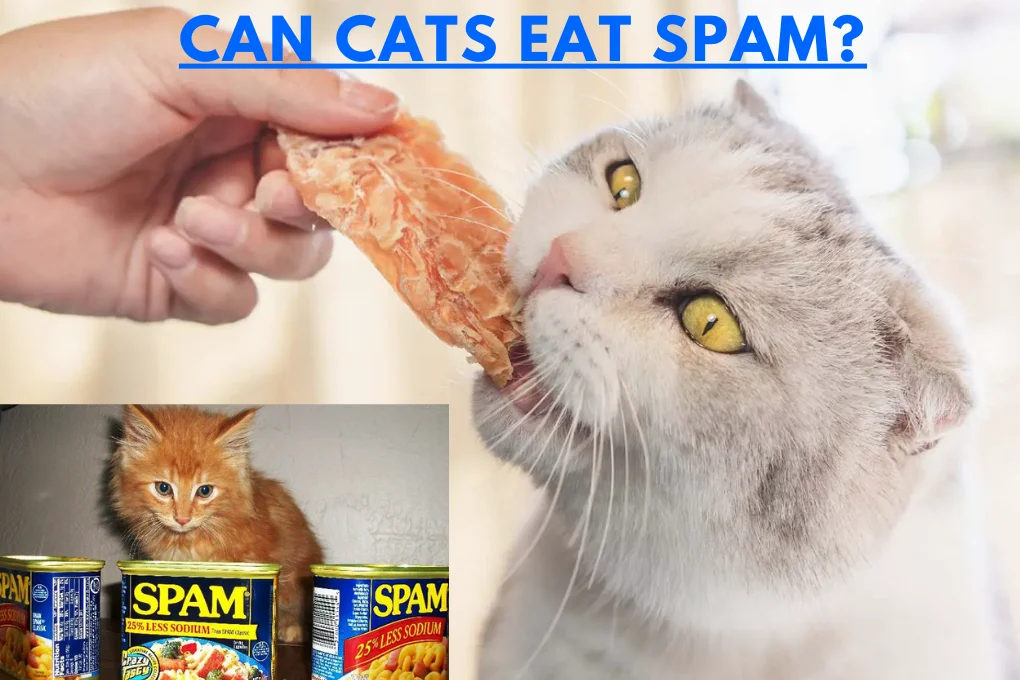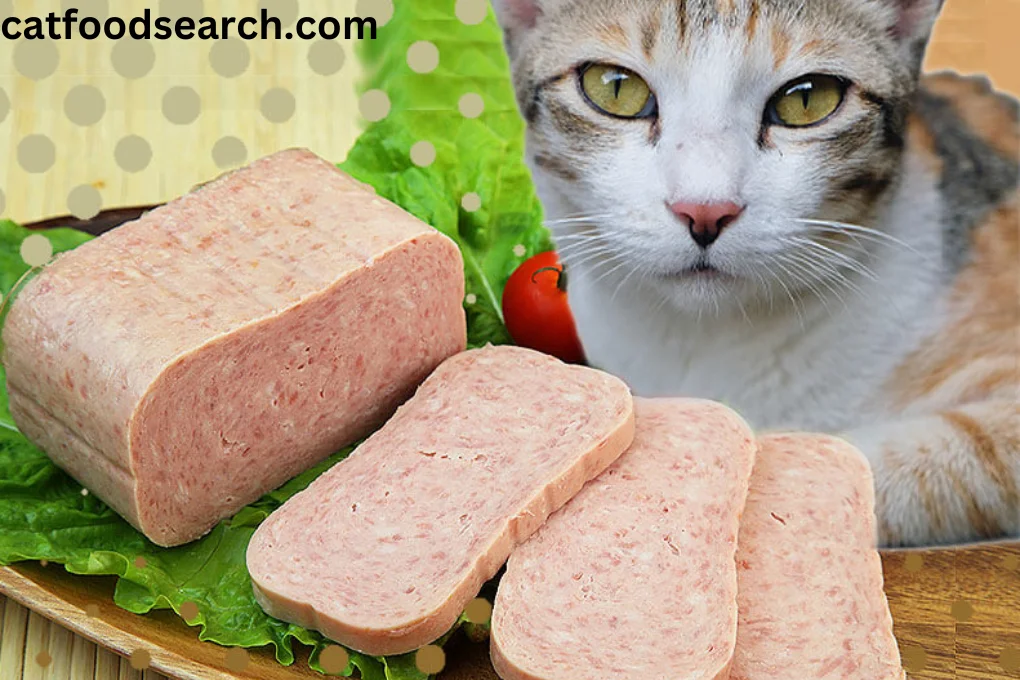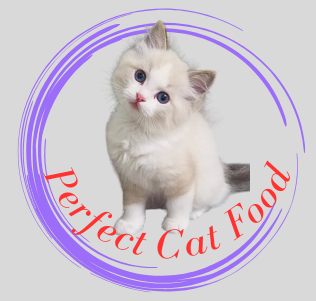Can cats eat spam? As a cat lover and a pet researcher, I am here to give you the solution to this intriguing question.
Many of us are guilty of indulging in the occasional can of spam, but what about our curious, four-legged companions?
Many cat owners wonder about the safety of feeding their pets various human foods, and one common question that arises is whether cats can eat spam.
The short answer is no; Spam is not a suitable dietary option for cats.
Cats are quite discerning in their dietary choices, so it is essential to be well-informed about what is safe and appropriate for them to eat.
In this blog post, I will explore whether cats can eat spam without any adverse effects on their health. So, let’s get started on this culinary exploration for our beloved furry friends!

Table of Contents
What is Spam?
Spam is a canned meat product that has been around for decades. It’s made from pork and ham, sometimes with added ingredients. Created by Hormel Foods in 1937, it gained popularity during World War II.
Spam has a long shelf life due to canning. It’s known for its distinctive rectangular shape and pink color. While some enjoy it, others find it less appealing. Apart from the meat version, there are variations like turkey spam and reduced-sodium options.
Despite its popularity, some people joke about it being mysterious. In essence, spam is a preserved meat product with a unique place in culinary history.
While it’s a popular human food, its suitability for cats is questionable.
What is Spam made of?
To assess whether cats can safely consume spam, let’s take a look at its ingredients:
Classic Spam contains only six ingredients:
- Pork
- Ham
- Potato Starch
- Salt
- Sugar
- Sodium Nitrite & Water.
Only a mere 2-ounce serving of Spam packs a hefty punch with 180 calories and a whopping 16 grams of fat!
Additionally, its sodium content is notably high, contributing to 34% of an individual’s recommended daily intake in just one serving.
Can Cats Eat Spam?
No, Cats should not eat spam. Spam is highly processed and loaded with salt and preservatives, which can be harmful to your feline friend.
Excessive salt can lead to dehydration and kidney problems in cats. Additionally, spam contains ingredients like garlic and onion powder, which are toxic to them.
Because Spam is made from pork, it poses no immediate toxicity risk to cats. Therefore, if your feline friend happens to sneak a nibble or two, there’s generally no need for excessive worry.
However, it’s not advisable to make Spam a regular part of your pet’s diet, not even as an occasional treat.
It’s evident that Spam isn’t the most healthful choice for cats. Its high-fat content, in particular, can contribute to weight gain if consumed too frequently.

Feline obesity is a prevalent nutritional concern that can lead to a range of health issues, such as diabetes, osteoarthritis, and pancreatitis.
Additionally, the sodium levels in Spam are cause for concern. Cats metabolize food differently from humans, and just 1/6th of a can of Spam contains roughly 20 times the daily recommended sodium intake for a cat.
An excessive dietary intake of sodium can result in salt toxicity, with 2-3 grams per kilogram of body weight being considered toxic for cats.
As a responsible cat owner, it’s crucial to prioritize your pet’s health and stick to a diet specially formulated for cats.
Avoid feeding them human food like spam, and opt for high-quality cat food that meets their nutritional needs. Your cat’s well-being should always come first.
Is Spam Good for Cats?
No, Spam is not good for cats. Cats have specific dietary needs that Spam does not meet.
Spam is high in sodium and fat, and if your cat consumes too much of it, it can cause a variety of adverse effects, including obesity, pancreatitis, diabetes, high blood pressure, and other health problems.
What to Do If Your Cat Accidentally Eats Spam?
If your cat accidentally eats Spam, there’s no need to worry too much. A small quantity of Spam is unlikely to result in immediate harm, but it’s essential to keep a close eye on your cat for any negative reactions.
Monitor your cat closely for any unusual symptoms like vomiting, diarrhea, or lethargy.
Quick action and professional guidance are crucial to ensure your cat’s safety when they ingest something they shouldn’t have.
Is Spam Safe for Cats?
Cats can technically eat small amounts of plain, cooked pork or ham, which are the primary ingredients in spam. However, spam itself is not the best choice for your feline companion due to its high salt and sodium nitrite content.
Alternatives to Spam for Cats
Instead of feeding your cat spam, consider these alternatives:
- High-quality commercial cat food
- Homemade cat treats using cat-safe ingredients
- Fresh, lean meats (cooked and unseasoned).
Can cats eat spam raw?
No, cats should not eat raw spam. Raw meat, including spam, can carry harmful bacteria like salmonella.
Feeding raw meat to cats can pose health risks for both the cat and the owner. It’s safer to cook any meat thoroughly before considering it for your cat’s diet.
Always prioritize your cat’s well-being and choose safe, specially formulated cat food for their nutrition. Raw spam is not a suitable choice for your feline friend.
FAQs
Can I give my cat a small piece of spam as a treat?
While it’s not recommended, a tiny piece of plain, cooked pork or ham is safer than giving them processed spam.
Are there any safe human foods for cats?
Some safe options include plain, cooked chicken or turkey without seasoning, and certain fruits and vegetables in moderation.
How can I ensure my cat gets a balanced diet?
Stick to high-quality commercial cat food that is designed to meet your cat’s nutritional needs.
Can cats eat other processed meats?
It’s best to avoid giving your cat processed meats like spam due to their high salt and preservative content.
Final Thoughts
In wrapping up our discussion on whether cats can eat spam, it’s abundantly clear that spam is not a feline-friendly food choice.
As responsible pet owners, we should always prioritize our furry friends’ well-being.
Spam, with its high salt content and potentially toxic ingredients, can harm our cats’ health. It’s essential to stick to specially formulated cat food to meet their unique nutritional needs.
While cats can technically eat small amounts of plain pork or ham found in spam, it’s not recommended due to the high sodium content and potential dangers associated with processed meats. Your cat’s health should always be a top priority, so choose their food carefully.

Hi there! My name is Koushik; I am a cat lover. I specialize in writing about pet care & food. I have a wealth of knowledge on cat food niches and related subjects. I have worked in the pet industry for over 5 years and am passionate about helping cat owners provide the best care for their furry friends. With knowledge of cat food and nutrition, I aim to share their insights and help cat owners navigate the world of cat food niches. I enjoy playing with my two cats, reading, and exploring new cat food brands in my free time.
